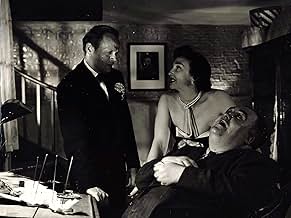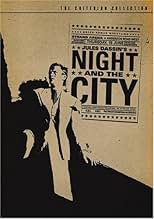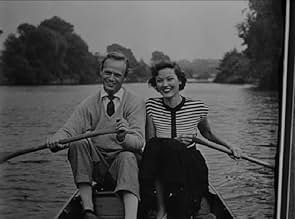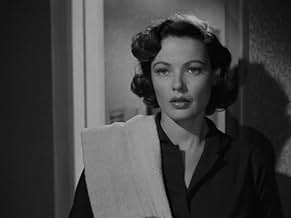PUNTUACIÓN EN IMDb
7,8/10
16 mil
TU PUNTUACIÓN
Un estafador de poca monta y un vendedor de clubes nocturnos se aprovecha de algunas circunstancias fortuitas y trata de convertirse en un gran jugador como promotor de lucha libre.Un estafador de poca monta y un vendedor de clubes nocturnos se aprovecha de algunas circunstancias fortuitas y trata de convertirse en un gran jugador como promotor de lucha libre.Un estafador de poca monta y un vendedor de clubes nocturnos se aprovecha de algunas circunstancias fortuitas y trata de convertirse en un gran jugador como promotor de lucha libre.
- Dirección
- Guión
- Reparto principal
Ken Richmond
- Nikolas of Athens
- (as Ken. Richmond)
Paul Beradi
- Diner
- (sin acreditar)
Derek Blomfield
- Young Policeman
- (sin acreditar)
Clifford Buckton
- Policeman
- (sin acreditar)
Ernest Butcher
- Bert
- (sin acreditar)
Peter Butterworth
- Thug
- (sin acreditar)
Naomi Chance
- Nightclub Hostess
- (sin acreditar)
Edward Chapman
- Hoskins
- (sin acreditar)
Reseñas destacadas
Every where Richard Widmark's loser character Harry Fabian turns in this film he finds golden opportunities smothered in bad timing. Widmark utilizes a variation of that smarmy, snickering sinister giggle-chuckle that was memorialized in Kiss of Death.It serves the actor well in this film in its toned-down form but offers up a sort of pathetic body language for Fabian, the character. It may be that this American ex-patriot character is just way out of his depth. His hucksterism is not much appreciated by many of his acquaintances in this seedy London underworld. If Harry Fabian would simply accept that he is destined to be a 3rd rate shill and stooge,he might have fund some small pleasures. However, his mind is a shade too quick and his ambition too pumped. He's a user with not a shread of remorse about stepping on others, ripping them off, keeping one tiny step ahead of exposure. This is a superb film, squalid and sinister in its portrayal of greed, corruption and betrayal.
For some reason Night and the City doesn't seem to the credit it deserves; possibly because it was director Jules Dassin's last American film before being blacklisted as a Communist. I wasn't born until the Cold War was winding down, but it seems that with movies like Night and the City to his credit, we could have turned a blind eye even if he really was a Commie.
Honestly this film deserves to rank up there with the likes of The Maltese Falcon, Double Indemnity, or Out of the Past. The scenes of our "hero" Harry Fabian (Richard Widmark, at his best) being chased through London's East End are as starkly beautiful as anything you'll ever see on film. For several minutes there isn't a single shade of gray, everything is literally black or white and the camera itself seems to have joined in hunting Harry. Then there's the long, semi-grotesque wrestling scene that took me totally by surprise, it's like something out of Fellini.
Widmark is utterly believable as Fabian, a charming two-bit grifter who works as a "club tout" but hatches one ill-fated get-rich-quick scheme after another. The rest of the cast is excellent as well, there isn't a cardboard character in the bunch, except maybe Harry's girl Marry (Gene Tierney) though its really more a flaw in the character than the actress. Mary's saintliness may be the writers' only slip-up though, every other character has the sort of depth that makes the film a joy to watch. They inexorably follow their own motivations, which, of course, rely on those of someone else, who inevitably has a goal of his or her own, which will eventually derail the plan of someone whom someone else is counting on (actually, the film is a little less twisted than this review ;-) Criterion has just (2/05) recently released Night and the City and never has the phrase "filmed in glorious black and white" been more appropriate. Before this film seemed to lurk in the shadows of AMC or TCM, only occasionally showing its face, as if it were one of the genre's minor works. Now, if you haven't seen it you have no excuse, and you're only hurting yourself.
Honestly this film deserves to rank up there with the likes of The Maltese Falcon, Double Indemnity, or Out of the Past. The scenes of our "hero" Harry Fabian (Richard Widmark, at his best) being chased through London's East End are as starkly beautiful as anything you'll ever see on film. For several minutes there isn't a single shade of gray, everything is literally black or white and the camera itself seems to have joined in hunting Harry. Then there's the long, semi-grotesque wrestling scene that took me totally by surprise, it's like something out of Fellini.
Widmark is utterly believable as Fabian, a charming two-bit grifter who works as a "club tout" but hatches one ill-fated get-rich-quick scheme after another. The rest of the cast is excellent as well, there isn't a cardboard character in the bunch, except maybe Harry's girl Marry (Gene Tierney) though its really more a flaw in the character than the actress. Mary's saintliness may be the writers' only slip-up though, every other character has the sort of depth that makes the film a joy to watch. They inexorably follow their own motivations, which, of course, rely on those of someone else, who inevitably has a goal of his or her own, which will eventually derail the plan of someone whom someone else is counting on (actually, the film is a little less twisted than this review ;-) Criterion has just (2/05) recently released Night and the City and never has the phrase "filmed in glorious black and white" been more appropriate. Before this film seemed to lurk in the shadows of AMC or TCM, only occasionally showing its face, as if it were one of the genre's minor works. Now, if you haven't seen it you have no excuse, and you're only hurting yourself.
The rise and fall of small-time hustler Harry Fabain is chronicled in this noir thriller by Director Jules Dassin.
This was Dassin's American swansong, completed just before being named by fellow director Ed Dmytryk before HUAK as a "communist," thus ending Dassin's American career.
He brought to "Night and the City" all the technique he acquired over years of quality movie making. Although born in Connecticut and raised and trained in the US, Dassin's work always had the look and feel of his European counterpart, Carol Reed.
The script here is a decent one with surprise turns, avoiding predictability. Franz Waxman's high pitched score adds excitement to the proceedings and Gene Tierney is a creditable second lead.
Yet it's Richard Widmark on whose shoulders the success of this film ultimately rests. It's not an easy role, as Fabian's character runs the gamut of emotional range as he struggles to wheel and deal his petty schemes amongst assorted lowlife types.
Widmark proves he's well up to the challenge, creating a strong portrait of a small time hood striving for positive payoffs through his callous cleverness.
It's a reminder of how talented and resourceful this actor is, and how he and Dassin meshed to create a film of impact.
Dassin, of course, went on to France after this to engage in a fabulous European period, while Widmark struggled to find scripts worthy of his formidable talents, which turned out to be few and far between.
This was Dassin's American swansong, completed just before being named by fellow director Ed Dmytryk before HUAK as a "communist," thus ending Dassin's American career.
He brought to "Night and the City" all the technique he acquired over years of quality movie making. Although born in Connecticut and raised and trained in the US, Dassin's work always had the look and feel of his European counterpart, Carol Reed.
The script here is a decent one with surprise turns, avoiding predictability. Franz Waxman's high pitched score adds excitement to the proceedings and Gene Tierney is a creditable second lead.
Yet it's Richard Widmark on whose shoulders the success of this film ultimately rests. It's not an easy role, as Fabian's character runs the gamut of emotional range as he struggles to wheel and deal his petty schemes amongst assorted lowlife types.
Widmark proves he's well up to the challenge, creating a strong portrait of a small time hood striving for positive payoffs through his callous cleverness.
It's a reminder of how talented and resourceful this actor is, and how he and Dassin meshed to create a film of impact.
Dassin, of course, went on to France after this to engage in a fabulous European period, while Widmark struggled to find scripts worthy of his formidable talents, which turned out to be few and far between.
The more films I see by Jules Dassin, the more I wonder why he isn't better known or regarded as a director. It's been 56 years since he was blacklisted by the McCarthy-ites, but his reputation never seems to have recovered, at least not in the United States. Hopefully, more DVD releases like the Criterion version of Night and the City will bring deserved attention to his excellent body of work.
I want to call Night and the City a classic film noir, which it is, but that seems too limiting. It might be better to say that Dassin uses film noir to dig a little deeper into our human strivings and sufferings. There's a lot of sweat and desperation in the midst of this entertaining and well-paced film, and not just on the part of Harry Fabian, the small-time hustler who dreams of being great. We encounter a typically smooth and dangerous mobster who also happens to have a difficult relationship with his disappointed father. A wealthy but thugish club owner, who might be a caricature in another film noir, can't seem to express his powerful and animalistic feelings for his beautiful wife. She seems like a scheming femme fatale but turns out to have an almost quaint dream of her own. In the end, we're in the muck and mire of human foibles, a kind of low-level Shakespearean tragedy that we all live out to one degree or another. This story just happens to take place in the shadowy underworld of 1950 London.
There's a poignancy to this film that separates it from others in the noir genre. Part of this lies in the strong writing, part in the excellent acting ensemble. This is one of those rare and remarkable films where the secondary and minor actors seem like they were all giving the performance of their career. Richard Widmark probably could have done with a bit more subtlety as Harry Fabian; he feels a bit histrionic at times, but his manic energy is important to the pace of the film and the feeling of increasing desperation. Gene Tierney and Hugh Marlowe don't get to do much and seem a bit lost among all the other great roles. In an interview with Dassin included with the DVD, the director says he put Tierney in the film as a favor to producer Daryl Zanuck, adding her role at the last minute, and it feels like that at times. But, hey, it's Gene Tierney.
Herbert Lom delivers a chilling performance as Kristo the mobster, and Stanislaus Zbyszko is a miracle as his father, the once-famous wrestler Gregorious who can't stand that his son has helped kill the great tradition of Greco-Roman wrestling with his shoddy wrestling matches. The great Mike Mazurki does well as The Strangler, and the wrestling match he gets into with Gregorious may be the highlight of the film. Zbyszko and Mazurki were both former wrestlers, and the realism of their fight heightens the emotional intensity of the scene. It's the brutal scruff and claw of existence brought to life on screen for a few powerful moments.
I had never seen Francis Sullivan before, so I was pleasantly surprised by his masterful work as the club owner Nosseross. Googie Withers also does a great job as his wife Helen, managing to bring some good shading to an underwritten role. And some of the best moments of the film are delivered by minor characters such as Anna, the woman who works down on the docks; Figler, the "King of the Beggars;" and Googin the forger.
After a brief voice-over intro, Dassin starts the action with a bang, as one man chases another through the darkness of late-night London, across what looks like the plaza in front of the British Museum (???). The camera angle on this opening is fantastic, the kind of shot you want to turn into a poster and hang on your wall. And the camera work remains excellent throughout the film. The final long sequence of Harry running all over London in the foggy darkness, with the whole world seemingly after him, is an exciting and powerful climax. Quite a memorable ending to this excellent film.
I want to call Night and the City a classic film noir, which it is, but that seems too limiting. It might be better to say that Dassin uses film noir to dig a little deeper into our human strivings and sufferings. There's a lot of sweat and desperation in the midst of this entertaining and well-paced film, and not just on the part of Harry Fabian, the small-time hustler who dreams of being great. We encounter a typically smooth and dangerous mobster who also happens to have a difficult relationship with his disappointed father. A wealthy but thugish club owner, who might be a caricature in another film noir, can't seem to express his powerful and animalistic feelings for his beautiful wife. She seems like a scheming femme fatale but turns out to have an almost quaint dream of her own. In the end, we're in the muck and mire of human foibles, a kind of low-level Shakespearean tragedy that we all live out to one degree or another. This story just happens to take place in the shadowy underworld of 1950 London.
There's a poignancy to this film that separates it from others in the noir genre. Part of this lies in the strong writing, part in the excellent acting ensemble. This is one of those rare and remarkable films where the secondary and minor actors seem like they were all giving the performance of their career. Richard Widmark probably could have done with a bit more subtlety as Harry Fabian; he feels a bit histrionic at times, but his manic energy is important to the pace of the film and the feeling of increasing desperation. Gene Tierney and Hugh Marlowe don't get to do much and seem a bit lost among all the other great roles. In an interview with Dassin included with the DVD, the director says he put Tierney in the film as a favor to producer Daryl Zanuck, adding her role at the last minute, and it feels like that at times. But, hey, it's Gene Tierney.
Herbert Lom delivers a chilling performance as Kristo the mobster, and Stanislaus Zbyszko is a miracle as his father, the once-famous wrestler Gregorious who can't stand that his son has helped kill the great tradition of Greco-Roman wrestling with his shoddy wrestling matches. The great Mike Mazurki does well as The Strangler, and the wrestling match he gets into with Gregorious may be the highlight of the film. Zbyszko and Mazurki were both former wrestlers, and the realism of their fight heightens the emotional intensity of the scene. It's the brutal scruff and claw of existence brought to life on screen for a few powerful moments.
I had never seen Francis Sullivan before, so I was pleasantly surprised by his masterful work as the club owner Nosseross. Googie Withers also does a great job as his wife Helen, managing to bring some good shading to an underwritten role. And some of the best moments of the film are delivered by minor characters such as Anna, the woman who works down on the docks; Figler, the "King of the Beggars;" and Googin the forger.
After a brief voice-over intro, Dassin starts the action with a bang, as one man chases another through the darkness of late-night London, across what looks like the plaza in front of the British Museum (???). The camera angle on this opening is fantastic, the kind of shot you want to turn into a poster and hang on your wall. And the camera work remains excellent throughout the film. The final long sequence of Harry running all over London in the foggy darkness, with the whole world seemingly after him, is an exciting and powerful climax. Quite a memorable ending to this excellent film.
In London, the swindler Harry Fabian (Richard Widmark) is an ambitious loser, frequently taking money from his girlfriend Mary Bristol (Gene Tierney). When he meets the famous Greco-Roman wrestler Gregorius the Great (Stanislaus Zbyszko) in the arena of his son and the wrestling lord Kristo (Herbert Lorn), he plans a scheme to become successful. He cheats Greorious, promising clean combats in his own arena, and the old man accepts the partnership. However, without money to promote the fight, he invites his boss and owner of a nightclub Phil Nosseross (Francis L. Sullivan) to be his partner, but is betrayed and his business fails ending in a tragedy.
"Night and the City" is a great film-noir, with many twists and another excellent performance of Richard Widmark. The story shows the underworld of London, with low-lives, hustlers, beggars, gamblers and other amoral characters through a magnificent black and white cinematography. The direction of Jules Dassin is sharp and the screenplay perfectly develops the characters and the story in an excellent pace. The Brazilian distributor Oregon Filmes / Fox has one of the best collections of movies labeled "Tesouros da Sétima Arte" ("Treasures of the Seventh Art"). Unfortunately, most of their DVDs shamefully have problems while playing the film, maybe because of the lack of quality of the laboratory they use. My vote is nine.
Title (Brazil): "Sombras do Mal" ("Shadows of Evil")
Note: On 10 October 2016, I saw this film again.
"Night and the City" is a great film-noir, with many twists and another excellent performance of Richard Widmark. The story shows the underworld of London, with low-lives, hustlers, beggars, gamblers and other amoral characters through a magnificent black and white cinematography. The direction of Jules Dassin is sharp and the screenplay perfectly develops the characters and the story in an excellent pace. The Brazilian distributor Oregon Filmes / Fox has one of the best collections of movies labeled "Tesouros da Sétima Arte" ("Treasures of the Seventh Art"). Unfortunately, most of their DVDs shamefully have problems while playing the film, maybe because of the lack of quality of the laboratory they use. My vote is nine.
Title (Brazil): "Sombras do Mal" ("Shadows of Evil")
Note: On 10 October 2016, I saw this film again.
¿Sabías que...?
- CuriosidadesDirector Jules Dassin made the film while in the process of being blacklisted. Fox studio chief Darryl F. Zanuck told him it could possibly be the last film he'd ever direct, so he should shoot the most expensive scenes first so the studio wouldn't be able to blacklist him until it was completed.
- PifiasAs Harry is being chased through the streets of London at night, he runs down a set of stairs, then turns and runs down a lit street. In the foreground, the cameraman and director's shadows are clearly outlined against the street.
- Citas
Opening voice-over: Night and the city. The night is tonight, tomorrow night... or any night. The city is London.
- Versiones alternativasThere are two versions of this film: the British release and the International/American release. Some examples are: a differing voice-over speech; some changed dialogue; the opening scene where Harry returns home after 3 days away is a different take and the nightclub scenes are longer in the British version. The scores of the two films are also entirely different and alternate shots are used at the ending in the British version.
- ConexionesEdited into American Cinema: Film Noir (1995)
- Banda sonoraHere's to Champagne
(uncredited)
Written by Noel Gay
Performed by Gene Tierney (voice dubbed by Maudie Edwards)
Selecciones populares
Inicia sesión para calificar y añadir a tu lista para recibir recomendaciones personalizadas
- How long is Night and the City?Con tecnología de Alexa
Detalles
- Fecha de lanzamiento
- País de origen
- Idioma
- Títulos en diferentes países
- Siniestra obsesion
- Localizaciones del rodaje
- Hammersmith Bridge, Hammersmith, Londres, Inglaterra, Reino Unido(Harry runs across this bridge after leaving Figler's hideout, running to Anna O'Leary's boat shop)
- Empresas productoras
- Ver más compañías en los créditos en IMDbPro
Taquilla
- Recaudación en todo el mundo
- 43.024 US$
- Duración1 hora 41 minutos
- Color
- Relación de aspecto
- 1.37 : 1
Contribuir a esta página
Sugerir un cambio o añadir el contenido que falta

Principal laguna de datos
By what name was Noche en la ciudad (1950) officially released in India in English?
Responde


































